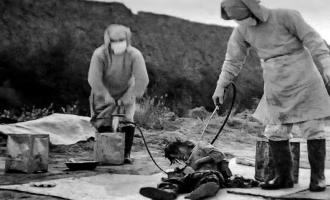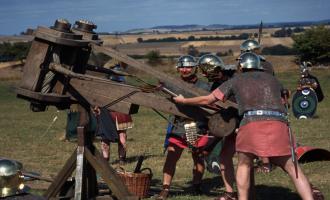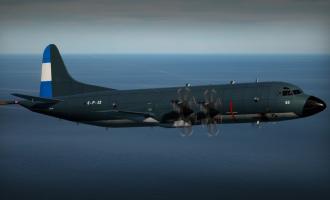Highly revealing is the American-Jewish institute JISS.ORG and its experts Hay Eytan Cohen Yanarocak and Jonathan Spyer on the role of the deep Turkish state and Erdogan's policy in Greece, Cyprus, Libya, Syria, South Caucasus and the Central Asia.
A group of generals along with the AKP have set up an entire secret army for special operations against Syria, Iraq, the Kurds and the Mediterranean countries.
This is a private military and paramilitary system that supports Ankara's neo-Ottoman dreams of projecting Turkish rule throughout the Middle East and the Mediterranean.
Under President Recep Tayyip Erdogan and the AKP, Turkey seeks to become a sovereign regional power, projecting power in neighboring countries and across the Mediterranean.
In cooperation with a variety of factors, mainly SADAT mercenaries, the Syrian National Army, MIT and other organizations, Turkey has developed over the past decade a large group of well-trained, easily developed and uninterrupted expendable forces, as a tool for projecting power, with convenient degree of reasonable reliability.
When this paramilitary force is combined with Turkish informal but government-led organizations, such as the Grey Wolves, it becomes clear that Erdogan now has a private military and paramilitary system in his hands.
The use of these proxies is based on methods developed by the so-called deep state long before the AKP came to power.
Ironically, this system serves the Kemalists, anti-Islamists, and Islamists, now pursuing an Islamist, neo-Ottoman (and, once again, anti-Kurdish) agenda.
Erdogan is developing this system for domestic and foreign military and non-military operations without formal supervision. Syria was the first place to put it into action. His proxies were then used in Libya and Nagorno-Karabakh to advance Turkey's foreign policy goals.
There are now reports of Syrian jihadists being deployed in Qatar. Therefore, all the countries of the Middle East and the Mediterranean must pay special attention to the nature of this Turkish paramilitary system, its advantages and potential vulnerabilities.
This study is the first attempt to systematically detect the roots, development and structure of Erdogan's informal military framework. It is also the first foreign policy / national security study to be published jointly by a team of experts from Israel and the UAE.
To understand the foundations of this practice, it is necessary to trace the roots of this system back to the days when the Turkish army ruled the state. Given their role in founding the modern Turkish nation-state, the Turkish Armed Forces (Türk Silahlı Kuvvetleri or TSK) have always considered themselves the true custodians of the Turkish Republic.
This perception was shaped mainly by their role in the decade of conventional wars that lasted until 1922. The founder of modern Turkey, Mustafa Kemal Ataturk, the leader of the armed forces, resigned from the army at some point to become president, resulting in a reduction of its role in the centers of power of the Turkish forces.
A contractual relationship was then formed between the army and the Cumhuriyet Halk Partisi (CHP), which was originally the only party in Turkey.
Turkish generals from then until today considered themselves as the core of the state moving away from politics. This led to the alienation of the army from the political sphere, pushing it to create a secret organization structure.
The top leadership of the army developed a culture of secret networking, loyal to the "state" and not to the "elected government".
Guided by the imperative of loyalty to the interests of the state, as defined by the "deep state", the Turkish army engaged in military coups to re-establish policies that were considered to threaten the state.
In the eyes of the armed forces, politicians were merely "coordinators", and so these forces constantly aim to protect the state from elected political governments. Due to many similar interventions, the concept of "deep state" (Derin Devlet) has evolved into a recognized political term in the dictionary of Turkish politics.
Although President Erdogan could overthrow military rule at first, he was unable to take any steps because the political culture of the "deep state" is still evident and strong.
However, it has now been transformed from a tool of Kemalist and secular repression into an ambitious system for achieving a neo-Ottoman agenda.
Today, President Erdogan's AKP and the MHP ally dominate the Turkish state without significant opposition. The two parties dominate all state institutions and mechanisms, including the deep state and its secret tools.
To strengthen his position in the country, Erdogan continues to pursue a hardline Islamist, nationalist and increasingly strong neo-Ottoman stance in Turkish foreign policy.
In addition to relying on Turkey's military and paramilitary campaigns, Erdogan is using the Gray Wolves, SADAT and other elements in implementing his agenda.
These organizations have a responsibility to secure and guarantee Erdogan's power in Turkey from any coup attempts, while at the same time serving the Turkish president's ambitions abroad. Turkey's activities in Europe, Syria and Libya and the Mediterranean, as well as Karabakh and Central Asia serve as concrete examples.
Threats from the combined action of the deep state, the AKP, the Turkish army, paramilitary units and MIT, threaten all the countries of the Eastern Mediterranean (including Greece and Cyprus) and this is the harsh reality that we should never forget.
*Translated and edited by Evangelos D. Kokkinos

















